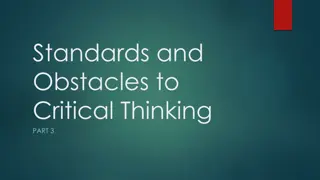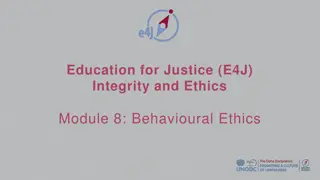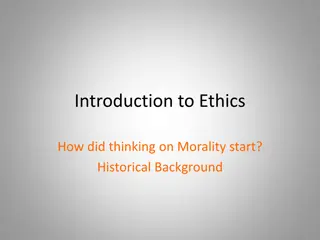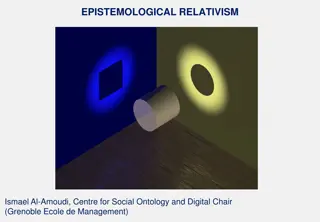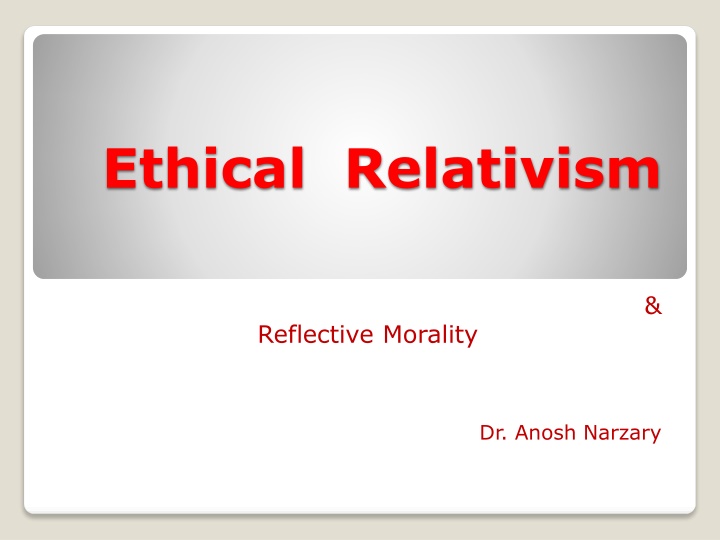
Ethical Relativism and Reflective Morality in Society
Explore the concept of ethical relativism, where morality is relative to cultural norms, and the importance of reflective morality in critically analyzing and evaluating traditional moral teachings. Discover how philosophers advocate for reason in examining moral beliefs to ensure their basis in truth.
Download Presentation

Please find below an Image/Link to download the presentation.
The content on the website is provided AS IS for your information and personal use only. It may not be sold, licensed, or shared on other websites without obtaining consent from the author. If you encounter any issues during the download, it is possible that the publisher has removed the file from their server.
You are allowed to download the files provided on this website for personal or commercial use, subject to the condition that they are used lawfully. All files are the property of their respective owners.
The content on the website is provided AS IS for your information and personal use only. It may not be sold, licensed, or shared on other websites without obtaining consent from the author.
E N D
Presentation Transcript
Ethical Relativism & Reflective Morality Dr. Anosh Narzary
What is ethical relativism? Ethical relativism is the theory that holds that morality is relative to the norms of one's culture. That is, whether an action is right or wrong depends on the moral norms of the society in which it is practiced. The same action may be morally right in one society but be morally wrong in another.
Relativists often do claim that an action/judgment etc. is morally required of a person. For example, if a person believes that stealing is morally wrong, then it IS wrong -- for her/him. In other words, it would be morally wrong for Susan to have an abortion if Susan believed that abortion is always morally wrong.
Moral relativism or ethical relativism (often reformulated as relativist ethics or relativist morality) it is a term used to describe several philosophical positions concerned with the differences in moral judgments across different peoples and their own particular cultures.
Customary or Traditional Morality We are all quite familiar with customary or traditional morality because we are all born into it; it is the first morality with which we come into contact. Morality that exists in various cultures and societies is usually based on custom or tradition, and it is presented to its members, often without critical analysis or evaluation, throughout their childhood and adult years. There is nothing necessarily wrong or bad about this approach to training society s youth and also its members as a whole. Many customs and traditions are quite effective and helpful in creating moral societies. Many moral teachings have arisen out of human need in social interaction and have become customs and traditions in a particular society. For example, in order to live together creatively and in peace, one of the first moral teachings or rules has to be about taking human life because, obviously, if life is constantly in danger, then it is very difficult for people to live and work together. However, in order for customs and traditions to be effective and continuously applicable to the members of a society, they must be critically analyzed, tested, and evaluated, and this is where reflective morality comes in.
Philosophers in general demand of themselves and others that every human belief, proposition, or idea be examined carefully and critically to ensure that it has its basis in truth. Morality is no different from any other area of philosophic study in this respect. Philosophers do not suggest that custom and tradition be eliminated or thrown out, but they do urge human beings to use reason to examine the basis and effectiveness of all moral teachings or rules, no matter how traditional or accepted they are. In other words, philosophy requires human beings to reflect on their moral customs and traditions to determine whether they should be retained or eliminated.
It is important, then, that all customs, traditions, systems of ethics, rules, and ethical theories should analyzed and critically evaluated before we continue to accept or live by them. be carefully Again, we should not reject them out of hand, but neither should we endorse them wholeheartedly unless we have subjected them to careful, logical scrutiny. Different culture have different customary laws, which reflects among the different cultures of the world.
Therefore: Reflective morals are those that are based on what you believe to be right and not others. The ideas related to the development of art, values, human rights and quality education etc., all are because of man's reflection. Reflective morality is the best stage of development of morality in human society

